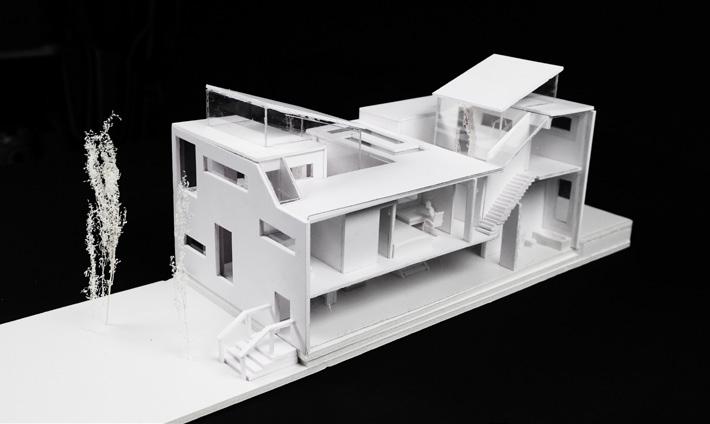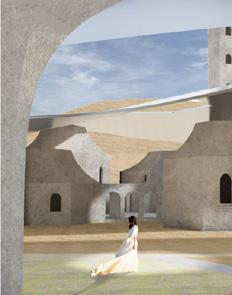ABOUT VERNACULAR
DESIGNED BY HE TIAN

PROLOGUE
My portfolio is about vernacular.
People say that architecture is a frozen music, which carries different regional cultures and historical backgrounds. With the promotion of globalization, the architecture around the world tends to become more and more homogeneous, losing its uniqueness. If we travel to every city and see only generic skyscrapers and commercial complexes, it would be a disappointment. I believe the key to solving this problem is to explore the regional characteristics and historical traditions. In this portfolio, I will explore the unique characteristics of different regions and generate architectural designs that are in harmony with the local environment and customs, and capable of accommodating modern lifestyles.
The Dream House is located in the windy and sandy Arabian desert. It combines two elements of Arabian architecture, the Windcatcher and Bedouin tent, to create a space with a modern and fluid design that also maintains traditional Arabian features.
ART CATHEDRAL is to integrate the architectural form of classical monasteries with contemporary life and functions.
METABOLIC HARBOUR explores how people can live on a small island that is about to be submerged.
EAST LAKE GARDEN is about traditional Eastern aesthetics.
Let us start a virtual journey through my design.
IDEAL
MICRO
DREAM VILLA CONTENTS 01 METABOLIC HARBOUR 03 ART CATHEDRAL EAST LAKE GARDEN DESIGN ANTETYPE & OTHER WORKS 02 04 05
Inspired by Windcatcher and Bedouin Tent Sustainable Design for Sea Level Rise Integrate Tradition and Modern Life About Chinese Aethetics DREAM VILLA ANTETYPE
CATHEDRAL ANTETYE
ART
HOUSE
MUSEUM
Start a Virtual Journey to Riyard.
This project is located in the isolated Saudi desert with heavy wind and sands and the design approach is achieved based on the typology research of Arabian houses, and gardens. The design proposes two Arabic elements, the windcatcher, an ancient Arabian passive cooling device, and the Bedouin tent, which are combined as the roof of the building to cope with the windy and sandy climate conditions in the desert. It turns out that the wisdom of ancient Arabs can be implemented in modern life to achieve a more comfortable life. In terms of the architectural form, the continuous curved roof represents not only modern aesthetics but also the attitude of embracing the future.

01
DREAM VILLA
Based on Windcatcher and Bedouin Tent
Young Architect Competition Work
Academic Work/ Individual Work
2022.3-10 Year 4 Spring Semester
Instructor: Dr.Lei Jingjing (Leijj@hust.edu.cn)
Riyard, Saudi Arabic
Saudi Arabic

Arabic Dwelling Plan








Plan Feature
Damascus Dwelling 100 AD
Windcatcher and its Function

West Palace in Syria. 724-743 AD
Closed
Sectional Features





A windcatcher is a passive cooling feature commonly found in Arab buildings that utilizes natural ventilation to reduce indoor temperatures. It works by capturing and directing cool breezes into the building’s interior spaces, creating a pressure difference that draws in fresh air and expels hot air.


Arabic Garden Plan
Garden Pattern
Courtyards serve as a central feature of many buildings, providing natural light, ventilation, and a cool, shaded outdoor area for relaxation and socializing. They also create a sense of community and play a functional role in cooling the building’s interior by providing an open area for air to circulate.
Form Interpretation
Their most identifiable architectural design reflects the charbagh (or chahār bāgh) quadrilateral layout with four smaller gardens divided by walkways or flowing water.
Reflecting pools were strategically placed to reflect the building structures, interconnecting the exterior and interior spaces.
Garden Interpretation
Through the study of Arabic culture, two elements with the most Arabic characteristics are proposed, windcather and Bedouin tent. Combining these two elements creates a curvilinear space while adapting to the Arabian climate and achieving passive cooling.
Based on the characteristics of traditional Arabian gardens: the cross axis divides the garden into four parts. Curve the axis of the cross, and shape the four-part garden from a square to a circular space.




Rooms around a central open space
Adjoined on three sides
appearance Angled entrance
Adjacent House Main Road Adjacent House Main Road Yard Yard Adjacent House House House House Yard Entrance Street Adjacent House Adjacent House Adjacent House Construction of house with two stories Using the courtyard for vegetation Shalamar Gardens at Lahore The Windcatcher The Bedoin Tent The Desert Villa BLEND TWIST Generalife of Granada Chehel Sotoun pavilion Reflection Building Building the crossing axis divided into four parts reflecting pool is set Building grass grass grass grass grass grass To Main Building To Main Building To Entrance To Entrance grass grass
Water in Arabic culture represents the flow of time. Shrinking metal strips reflect the light and shadow of the water waves, making it feel sacred and serene.



Textured with traditional Arabic patterns, the aluminium sheets are punched and fastened to a curved structure. The sunlight passes through the holes of the aluminium sheet, casting beautiful light and shadow on the ground.

Charbagh is at the center of the landscape, where the roads meet. The tent roof has a hole above it, through which the sun shines on the ground.

At the entrance, there are three layers of tents with different heights, blocking each other, and the heights are scattered. Like welcoming guests from afar.








Program 1.reception 2. charbagh 3.tiger keep 4.gym 5.majilis 6.family hall 7.kitchen 8.cinema 9.dining room 10.mosque 11.bedroom 12.staff room 13.laundary 14.pool
3 Charbagh
View
1 Spiritual Spring View 2 Desert Tree View
4 Entrance 8.000m 0.450m 0.000m 10 6 5 8 9 7 5 11 11 11 13 4 3 1 2 14 14 14 14 14 14 V1 V2 V3 V4 0m 1 5 N 10
View
Extracting the most distinctive arched elements from Arab architecture, a space with beautiful curves is constructed. Introducing light creates a religious atmosphere. Majilis is a traditional Arab gathering space where people come together to socialize, discuss current events, enjoy cultural activities, or simply relax. It is typically a large room decorated with luxurious furnishings, colorful textiles, and intricate designs. The majilis is an important part of Arab social life and plays a vital role in preserving and promoting Arab cultural heritage.



Programs
1.reception
2. charbagh
3.tiger keep
4.gym
5.majilis
6.family hall


7.kitchen
8.cinema
9.dining room

10.mosque

11.bedroom
room

6 A A 8 5 9 14 7 B B 11 11 5 11 11 13 13 13 7
SECTION A-A
SECTION B-B
SPACE OUTDOOR BEDROOM SPACE THE ROOF VIEW MAJILIS ARABIC LIVING ROME
12.staff
13.laundary 14.pool LIVIING
ART CATHEDRAL
Integrate Tradition and Modern Life
Young Architects Competition Work Revised
Academic Work/ Individual Work
2022.12 Year 5 Autumn Semester
Instructor: Dr.Lei Jingjing (Leijj@hust.edu.cn)
Kells,Ireland

Ancient Form, Modern Life.
The project intends to maintain the relationship between the environment around them and people’s daily life, the wooden material is implemented to make space for the rural life in the project while the original walls are mostly composed of stones. In the study of the Gothic cross-shaped monastery, the cross-shaped plan layout was retained.
The site is a picturesque place surrounded by meadows and rivers, residents have an idyllic and peaceful life here. Therefore, wood as a people-friendly material is chosen first in the project and echoes with the darker and old ruins. When the cross-shaped layout of the ancient Gothic monastery is kept in this project, new programs are introduced into the ancient building as modern bookstores, exhibitions, restaurants and performances. Time passed by, and people can still feel the romance of classical architecture as well as enjoy the modern life.

02 Ireland
MAPPING OF KELLS
HISTORY BACKGROUND

Kells Priory was built in the early 12th century as a Benedictine monastery, primarily used for religious study and prayer by monks.
BUILT
12AC
Kells Priory was repeatedly invaded and attacked. During these invasions, the monastery suffered severe damage.
15AC
DAMAGED
PROTOTYPE INTERPRETATION

NO CATHOLIC FAITH

Kells Priory was closed and the monks were forced to leave, leaving the monastery in ruins.
PHOTO SPOT
Queen Elizabeth I passed the Act of Uniformity and banned the Catholic faith.
16AC
AGAINST BY QUEEN
TODAY
Today, Kells Priory is a historical monument. Kells Priory is also a popular photography spot.
KELLS LIFESTYLE
Cathedral Elevation



Prototype Disassembly Form Extraction Reassembly
SITE ZOOM IN
CHURCH SHEEP
SITE RESIDENTIAL SPOT ROUTE TO SITE RIVER FARM TOWN FARM FOLK


PAINTING PICNIC
KING’S RIVER
Salisbury Cathedral Plan Prototype Inserting Volume Along the Axis Insert Program of Modern Life






FORM GENERATION
Step1
Set crossing axis.




Step2
Step3
Insert Volumes follow the axis. Insert the centre tower.
Step4
Kells is a small town with a lot of historical charm, where people lead peaceful and pastoral lives like something out of a poem.
0m 100m 500m
Step5
Shape the slope roof. IntegrateVolumes on the sectional direction of the axis.


Step6
Insert the Semitransparent frosted glass material.
1km
0km
5km 10km
DOWNTOWN
KELLS BIRDEYE VIEW
BENNETTS BRIDGE
DOWNTOWN
KELL PRIORY



rigid insulation foam 25mm double dampproof sheet 150mm concrete sub-slab 60mm crushed stone 60mm -0.450m 2.150m 4.500m 6.500m THE DISPLAY SPACE THE BOOK AND BAR VIEW DIRECTION




Programs
8.ticket 0.000m 6.500m 7 8 1 1 6 2 2 2 5 4 2 2 0m 1 5 N 10
1.painting exhibition 2.sculpture exhibition 3.audience 4.stage 5.book store 6.restaurant 7.kitchen
METABOLIC HARBOUR 03
Sustainable Design for Sea Level Rise
NAWAO Competition Work

Academic Work/ Individual Work
2021.10 Year 3, Autumn Semester
Instructor: Dr.Lei Jingjing (Leijj@hust.edu.cn)
Tarawa, Kiribati Kiribati

Island Fades Life Stands.
‘Metabolism’ is the principle of this urban design in Tarawa island, it is achieved by a prefabrication system and organic urban renewal intentionally.
Modular steel components are prefabricated in the factory via an industrialized assembly line, transported to Tarawa by cargo in large quantities and then assembled on-site. Additionally, water collection, water purification and power generation devices would also be equipped.
Also, 4 key issues that are supposed to be addressed in the work are the rising sea levels, a lack of urban space, high population density and energy shortages. As the sea level rise is inevitable, the metabolism among original and new modules will be applied via urban design approaches to increase people’s adaptation towards climate change. In a metabolic island, the island fades but life stands.
PROBLEMS & CONCEPT
COMBINATION

SUSTAINABLE

SELF-
DEVICE

FAMILY
Insert different programs, ranging from energy, agriculture, public activities and family activities, into the cube units and combinate them into family units, then combinate such units into a bigger tribe unit.








A rainwater harvesting system works by collecting rainwater from rooftops, which is then filtered and stored for later use. Tarawa has a rainy season and a dry season, with abundant rainfall during the rainy season and scarce rainfall during the dry season. Stored in a water tank to address the problem of water scarcity during Tarawa’s dry season.

Self-sufficient hanging vegetable gardens are a method of growing vegetables without soil. Instead, plants are grown in hanging containers such as plastic bags, buckets, or pots filled with specific plant substrates such as humus, peat moss, or perlite to provide the necessary nutrients for growth.


OF TARAWA
MAPPING
0m 20m 50m Site Residential Spot School Electricity Station Water Station Habour Government Factory 2050 Flooded Area 2080 Flooded Area Frequently Affected AREA Market Spot 2100 Flooded Area
Gas Tank Restaurant Water Catch & Purify System Exhibition Family Hall Solar Energy Generator Performance Stage Bedroom Unit Family Unit Tribe Unit Wind Energy Generator Shop Farm Greenhouse Green Grocery Hanging Farm Gym Workshop
H2 O2 SUSTAINABLE DEVICES SELF-SUFFICIENT AGRICULTURE DIVERSIFIED INDUSTRY MODULES ASSEMBLY SPACE PROBLEMS ENERGY PROBLEMS FOOD PROBLEMS INDUSTRY PROBLEMS
DEVICES SYSTEM
SUFFICIENT SYSTEM
FOR LOCALS AND TOURISTS
UNIT TRIBE UNIT

FILTER FABRIC
RESERVOIR LAYER WITH OPTIONAL AGGREGATE
MOISTURE RETENTION LAYER
AERATION LAYER
THERMAL INSULATION
FRAINAGE LAYER
ROOT BARRIER
PROTECTION COURSE
WATERPROOFING MEMBRANE
STRUCTURE DECK



THE SUSTAINABLE SCENE

The Port The Hanging Farm Fresh fish are transported here from
THE ROOF DETAIL
Curved Ramps and Free Shaped Space.
The project thrives on the traditional Chinese gardens in Suzhou. There are 3 well-known applications of Chinese Garden philosophy -- “Different View with Every Step”, “Borrow the Scenery” and “Frame the Scenery”. The garden promenade is following the curved ramps and free-shaped spaces. Inspired by domestic Chinese aesthetics, the project pays more attention to the void space like gardens and yards instead of buildings alone.

EAST LAKE GARDEN
About Chinese Aethetics
Academic Work/ Individual Work
2021.3 Year 3 Spring Semester
Instructor: Pro. Xiaofeng Li (lixf@hust.edu.cn)
Wuhan, China
GARDEN FEATURES
Different View with Every Step


• In Chinese gardens, there are often long and twisting paths. Different scenery is designed to be seen in different locations.
Borrow the Scenery

• In Chinese gardens, the architecture far away are design to be a part of the garden. Designers care about how scenery far away integrate with the garden.


Frame the Scenery
• In Chinese gardens, scenery through the window is carefully design. The window frame the scenery like paintings.
7.550m 7.550m 4.450m 4.00m 4.500m 11.500m 0.000m
t=12mm double-coat
strips waterproofing mem
brane structural plywood t=12mm tile
asphalt
glass
1100 600 1300
larch boarding
wax finish furring
-
roof corrugated galvanized steel sheet
roof underlayment water-resistant plasterboard rafters
wool
DESIGN ANTETYPE & OTHER WORKS
DREAM VILLA ANTETYPE
Young Architect Competition Work
Academic Work/ Individual Work
2022.3 Submitted to YAC Year 4 Spring Semester
Instructor: Dr.Lei Jingjing (Leijj@hust. edu.cn)
Riyard, Saudi Arabic
This project is the prototype of my first project, DREAM VILLA, which I submitted to the YAC committee on March 16, 2022. Based on my understanding of Arab culture, I created spaces with an Arab style and thought about using light to enhance the atmosphere of the building. This was also my first time participating in an international competition. Due to my lack of experience in time management, unfortunately did not win. However, I spent several months delving deeper into Arab culture and constantly refining the project, and it became the first project in my portfolio.
ART CATHEDRAL ANTETYPE
Young Architect Competition Work
Academic Work/ Individual Work
2022.12 Submitted to YAC
Year 4 Spring Semester
Instructor: Dr.Lei Jingjing (Leijj@hust. edu.cn)
Kells, Ireland
DREAM HOUSE
HUST Basic Design Studio Work
Academic Work/ Individual Work
2019.9 Year 2 Winter Semester
Instructor: Lei jingjing (leijj@hust.edu.cn)
Wuhan, China
This is the design prototype of my second project, ART CATHEDRAL. When participating in the YAC competition, wanted to express a local atmosphere through the use of wood, which would harmonize with the surrounding rural environment. However, failed to convey a contrast between modern life and classical architectural forms. The design was rather plain. Therefore, in the process of revision, incorporated the concept of “light boxes” to enhance a sense of modernity.
This is my first architectural design project in university, which serves as the starting point of my exploration in architectural design. Through this design, I learned how to use physical models to refine my ideas. Although there are many impractical aspects when evaluated by the standards of completed projects, it reflects my early exploration in the study of architecture.

MICRO MUSEUM
Finalist of Young Architects Competition










Worked as leader with Azhar Dilxat & Xiaoke Chen
2022.4-7 Year 4 Spring Semester
Instructor: WenZhao (wenzhao@alumni. upenn.edu)
La Spezia, Italy
The Container Museum is an experimental design after learning the design methods of Bernard Tschumi -- the development history of a yacht company and some figurative objects are translated into abstract diagrams, and then generated concrete forms through the diagrams. In its narrative, the history of the Baglietto company are interpreted into 5 chapters, while the turning of each container block is treated as the dialogue between each chapter. This project takes the geometric narrative into consideration through the simple and clear way of form manipulation.
05










































































































